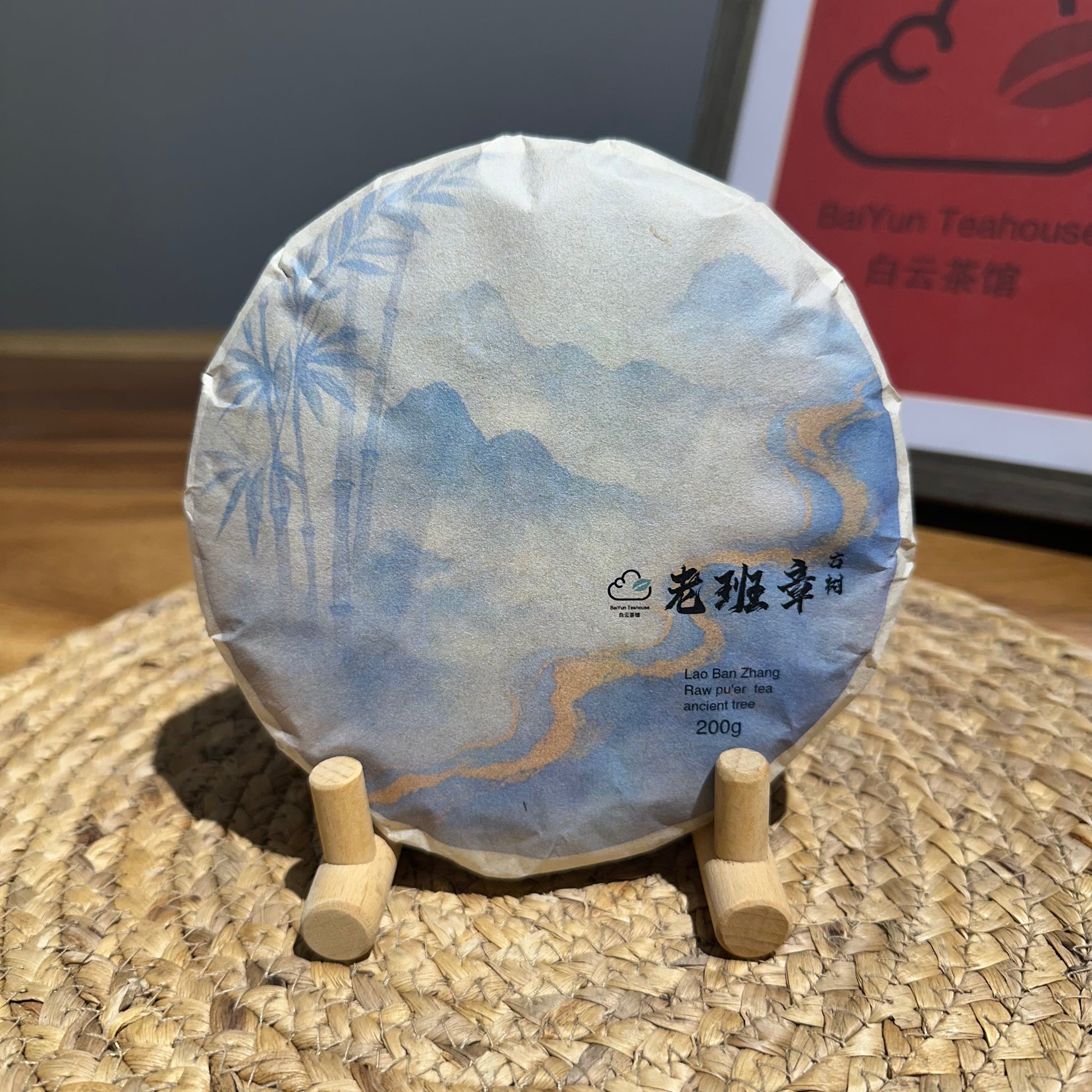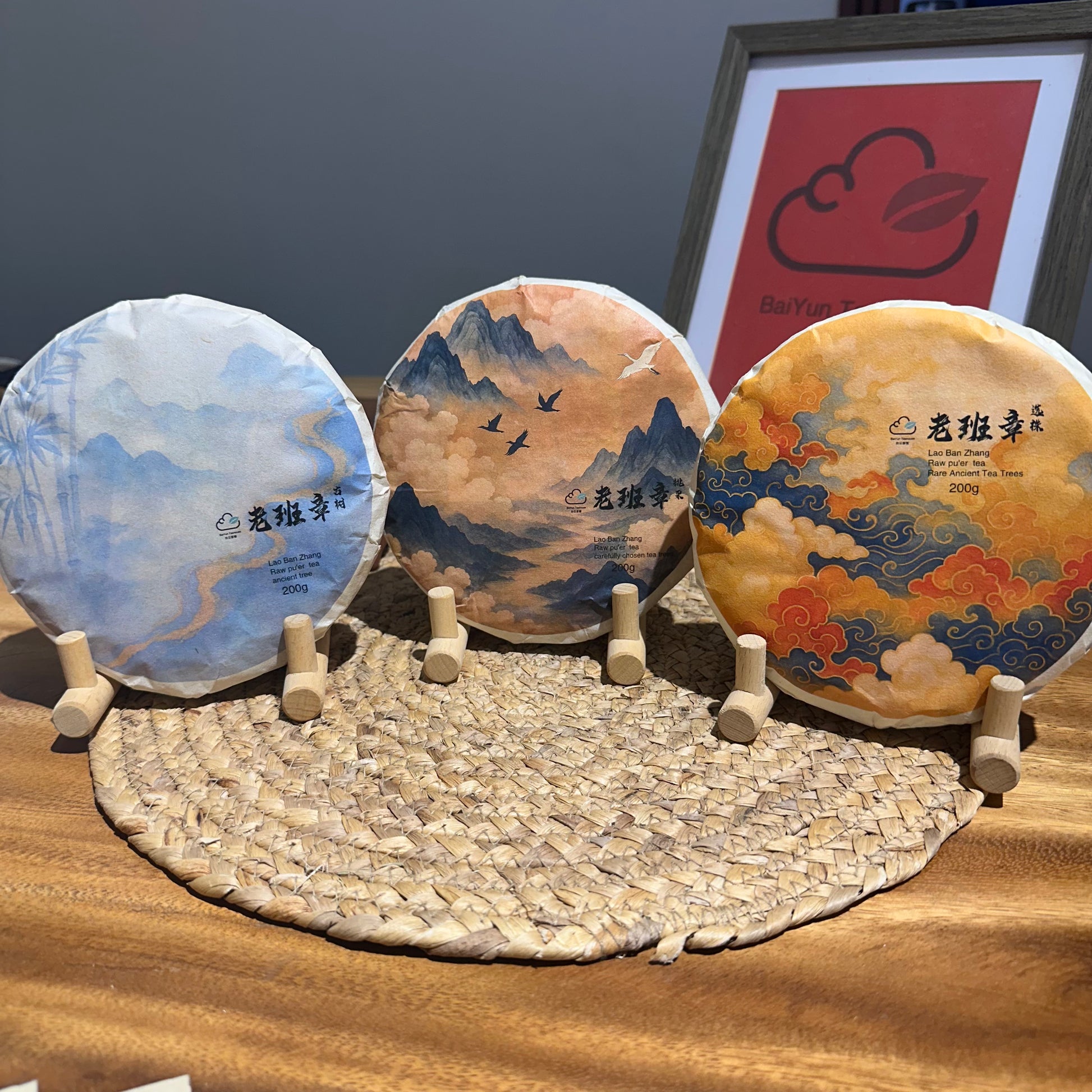BaiYun teahouse
Laobanzhang ancient tree Raw Pu’er Tea Cake – 200g(From Our Own Tea Garden)
Laobanzhang ancient tree Raw Pu’er Tea Cake – 200g(From Our Own Tea Garden)
Couldn't load pickup availability

(From Our Own Tea Garden)
What’s the pinnacle of Gongfu tea? It has to be Lao Banzhang Pu’er — a name every true tea lover knows.
Think of it as the Rolls-Royce of tea, the Lafite of brews, the Blue Mountain of the tea world.
Because Lao Banzhang is rare and expensive, counterfeits flood the market. To protect this thousand-year-old ancient tea garden, only those with deep partnerships with local farmers can enter during the spring harvest. Bringing in tea from other mountains is strictly forbidden.
Today, only three companies in the world have processing factories in Lao Banzhang — baiyunteahouse is one of them. You're welcome to visit our ancient tea garden in person — don't be fooled by fakes!
The taste? Bold and intense. Bitter at first, but quickly turns sweet, with rich floral and fruity notes that bloom in the mouth. After three years of aging, the flavor reaches new heights — this is the true summit of Gongfu tea.
🌿 Laobanzhang Gushu Raw Pu’er Tea Cake – 200g
The True Power of Laobanzhang: A Sharp Bitterness That Vanishes Into Sweetness
This 200g tea cake is the core representative of Baiyun Teahouse’s Laobanzhang series, harvested from our century-old ancient tea trees in the heart of the Laobanzhang region, Xishuangbanna. With intense cha qi and a rapid transition from bold bitterness to rich sweetness, this is the ultimate dream for any gong fu tea lover.
📍 Origin: Laobanzhang Village, Bulang Mountain, Xishuangbanna
🌳 Tree Age: 100+ year-old ancient tea trees
🧱 Type: 200g compressed cake
🕊️ Category: Raw Pu’er (Sheng Cha)
🏷️ Grade: Gushu – Ancient Tree
Produced in the Spring of 2025.

👑 What Is Laobanzhang?
Laobanzhang is the undisputed king of Pu’er.
Tucked deep within the Bulang Mountains at over 1,700m elevation, Laobanzhang village is surrounded by untouched rainforest and pristine air. The tea trees grow wild, enveloped in mist, nourished by rich mountain soil — no pesticides, no irrigation, no human interference. This is as pure as tea cultivation gets.
Baiyun Teahouse owns and manages ancient gardens in this core region. Some trees are over 600 years old. We only harvest spring tea and insist on full handcraft processing, with limited annual yields.

🍵 Flavor Profile
First sip: A sharp bitterness hits like a blade — intense, piercing.
Then, instantly: The bitterness dissolves into a sudden, clean sweetness — a moment of pure transformation.
Aroma: Orchid notes rise clear and high, with a wild mountain character.
Mouthfeel: Dense, heavy, with a distinct mineral richness.
Aftertaste: Strong huigan (returning sweetness), deep throat resonance, and long-lasting salivation.
Brew Durability: 20+ infusions, each yielding 6+ cups — perfect for multiple guests.
True gong fu tea lovers will feel the resonance of mountain, time, and body in every cup.
2025 Laobanzhang Spring Tea Pre-Sale
🌱 Why Choose Gushu?
Ancient trees grow slower and send their roots deeper, absorbing more minerals and complexity. Compared to plantation (taidi) tea, Gushu offers:
✅ Richer, more layered aroma
✅ Thicker, deeper body and longer sweetness
✅ Stronger cha qi and body sensations
✅ Better aging potential
🧘♂️ Who Is This Tea For?
This is a tea for those who seek strength, energy, and presence in their brew.
Not for casual sipping — this is a tea for focus, ceremony, and inner clarity.
If you’re already on the gong fu path, one session will leave a lasting impression.
🍂 Aging & Collectibility
Laobanzhang Gushu is one of the most coveted Pu’er teas for aging.
-
Rare ancient material with true origin
-
Dramatic transformation over time: bitterness fades, texture thickens, aroma deepens
-
High investment value with verifiable provenance
Properly stored, this tea can age 5–20+ years — or even longer. (The Forbidden City in Beijing still preserves 200-year-old Pu’er cakes!)

📦 Storage Tips
Keep in a dry, clean, odor-free, and ventilated space — out of direct light.
Best stored in breathable containers like zisha clay or unglazed pottery.
Avoid sealed plastics and overly humid environments.
🔥 Brewing Guide (Gong Fu Style)
Water temperature: 95–100°C (203–212°F)
Leaf-to-water ratio: 8g per 120ml
Rinse: Quick rinse (5 sec)
Vessel: Gaiwan or Yixing teapot
Each infusion yields ~6 cups; expect at least 20+ rounds.
Slow down and feel the cha qi unfold through the body, layer by layer.
✅ Baiyun Teahouse Guarantee
All of our Gushu Laobanzhang teas:
-
Come directly from our own core ancient tea gardens in Laobanzhang
-
Are verifiably authentic — with video traceability and optional garden visits
-
Contain no plantation tea, no blends, and no gimmicks
-
Are crafted entirely from spring harvest, with yearly batch labeling and harvest year clearly marked
You’re not just buying a famous name — you’re tasting the real Laobanzhang.
🎁 Gifts & Bundle Discount
🎁 Single Cake Purchase: Comes with a Baiyun Teahouse Tea Pick
🎁 Buy All Three Laobanzhang Types
Gushu- ancient tree
Tiaocai- carefully chosen tea trees
Xuanzhu-Rare Ancient lea rees
• Enjoy a special bundle price


(With the owner of Laobanzhang No. 89 Ancient Tea Garden)
All Baiyun Teahouse teas are certified under ISO 9001 (Quality Management System) — ensuring that every step of production is standardized and traceable —
and ISO 22000 (Food Safety Management System) — guaranteeing that every stage, from raw leaves to final packaging, meets international food safety standards
From tea leaf to teacup, every step follows world standards —
where quality is assured, safety is safeguarded, and trust is protected.





